While female celebrities like Jada Pinkett Smith and Gail Porter have helped us understand hair loss in women, men are rarely open about this subject and how it affects their self-image. Through Orlando Gili’s revealing portraits and interviews, men with experience of complete hair loss speak candidly about their condition and what it means to them.
As a portrait photographer, I’m fascinated by human faces and the stories they tell. My own face and appearance held little interest for me. This dramatically changed, however, in 2021 when over a six-month period all the hair on my body fell out. It felt like my face was being rubbed out, my identity erased.
My hair has since grown back, but I wanted to build on this unusual experience by meeting, interviewing and photographing the community of men who have experienced alopecia universalis.
The psychological challenges for men can be huge, compounded by the typically male characteristic of not talking about feelings, even to close friends and family. These portraits and interviews question the preconceptions we have around masculinity and vulnerability, and look to address the destructive male thought processes which exacerbate living with alopecia.
Ivan
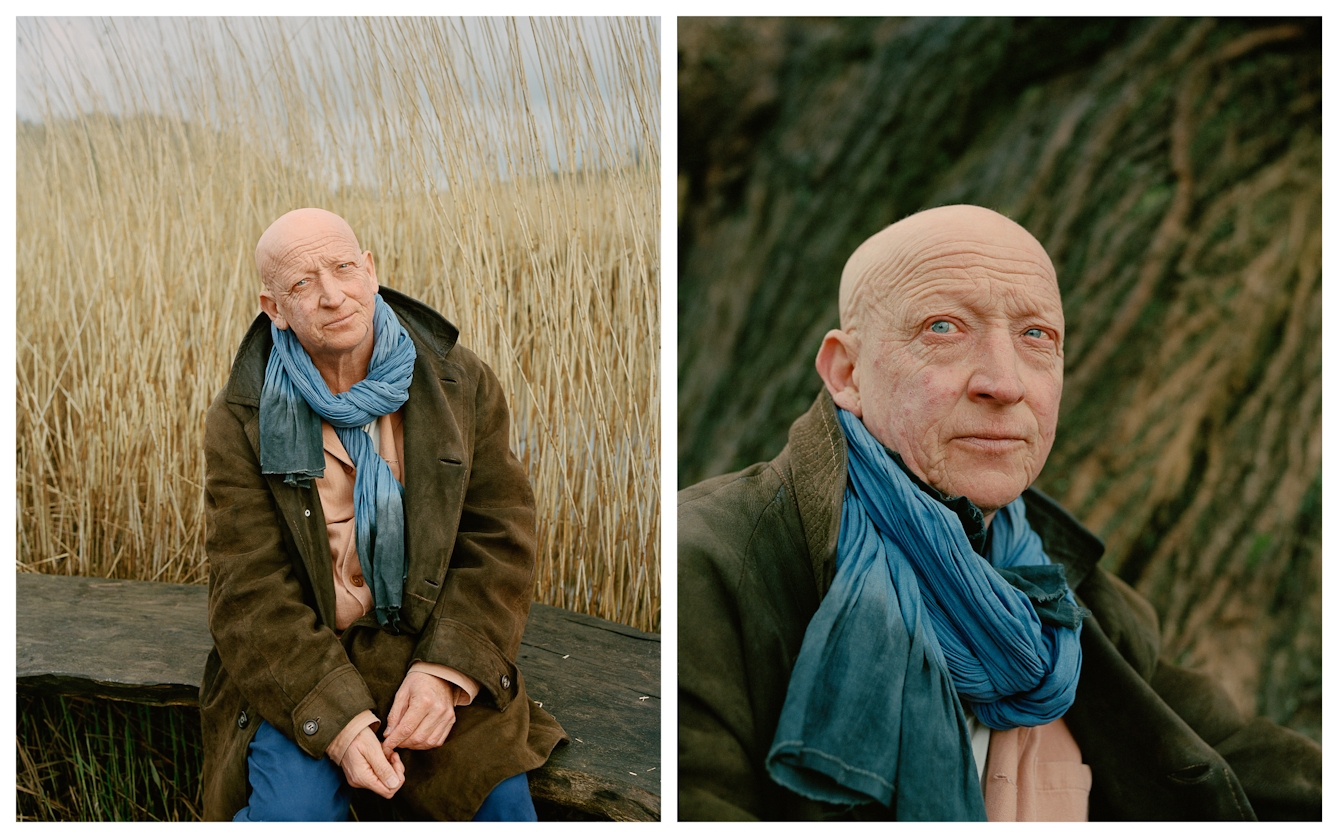
Ivan.
Every single hair fell out in about two weeks when I was 26. Bunches of it all over the pillow, all over the bed, everywhere. I worked in Italy at the time, and people just looked at me as if I had done something wrong.
My British family wanted me to come home and see a proper doctor, but I wanted to hide; I couldn’t face them because I felt that I had changed. It was a total loss of identity. Everything had gone, as if someone had robbed me of something, stolen my identity from a bin. I’m not sure I’ve ever adjusted. I never looked in the mirror before I married my wife; there were no mirrors in the house.
Men can be so stylised, with trimmed beards, and hair and makeup. It’s harder for me because I can’t do the hair thing, the beard thing, and I’m too old to do the body-pumping stuff. I’ve never been very macho, and I’ve probably got more friends that are women than men. I’ve kept my hair loss inside for 35 years. I just don’t talk about it. I think it’s in my makeup; it’s where I come from and my upbringing – you just don’t talk about these things.
Kadeer
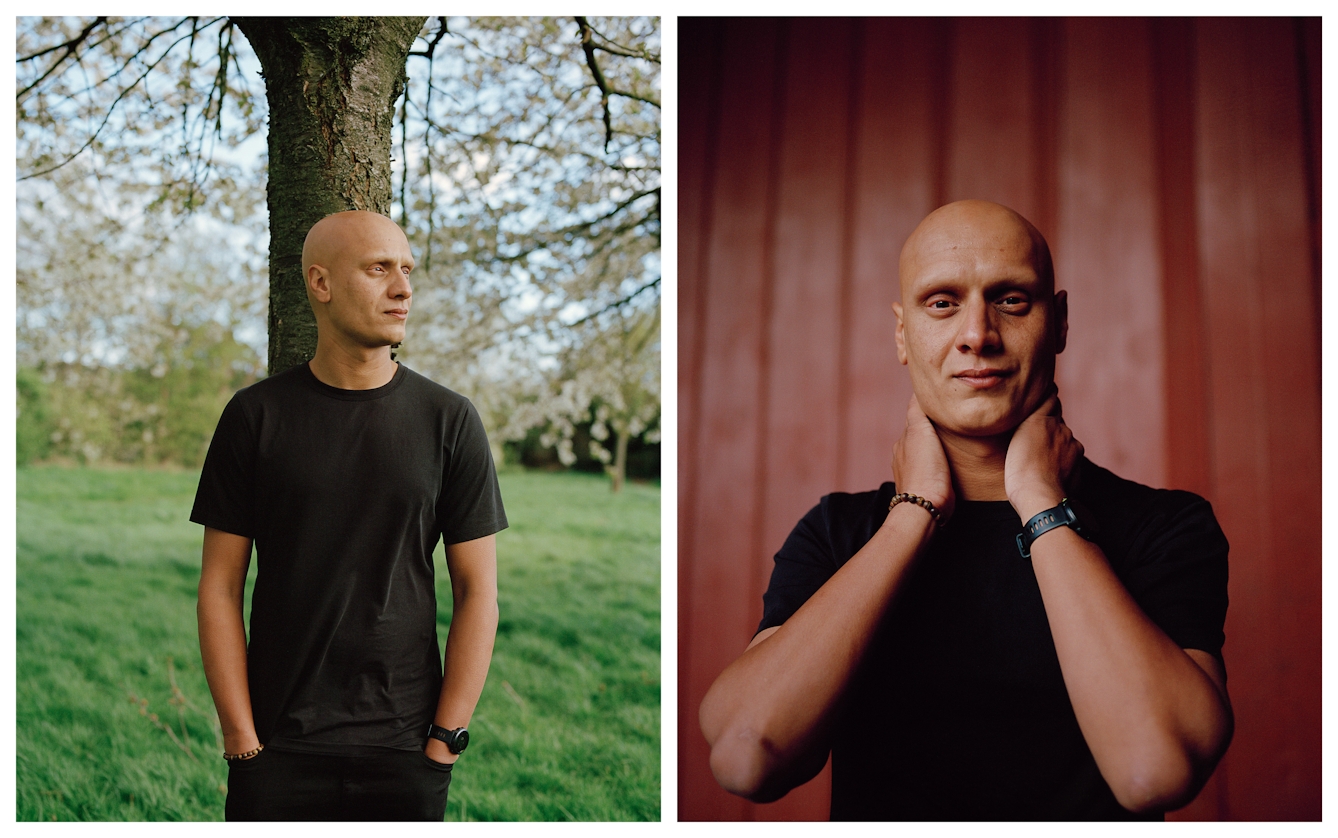
Kadeer.
I lost my hair about three years ago. It started as a small circle around the back of the head; it took about a month to completely disappear. Last year it all came back, pretty much the majority, except for a couple of little patches, but about four months ago it all just disappeared again.
The second time was much harder. You get happy: my hair is coming back, things are going well in life, and then all of sudden it’s “here we go again”. I think I’d rather it stayed one way or the other. It’s like being teased.
I didn’t realise how much it really changes the way you look. There is no bullshit: this is you, that’s it. Looking back at old photographs, I didn’t recognise myself. When I go through manual passport control with an immigration officer, they just don’t believe it’s me.
Once I was without any hair, people would take a little bit longer to warm to me; they would be a little hesitant when I approached them. It’s your first impressions – a lot of people assume you are terminally ill. They think bald, no hair – cancer. When I explain, people are like “oh well, it’s just hair, right?” It comes more from a lack of awareness rather than malice, but losing my hair is still a big deal for me.
In my experience, a beard is a big thing in Asian culture. Most guys will lose their hair, but they’ll have a solid beard. Having a beard in Islam is a sunnah, part of the practices of the Islamic Prophet Muhammad (peace be upon him). When you can’t have a beard, you feel almost incomplete.
Tom
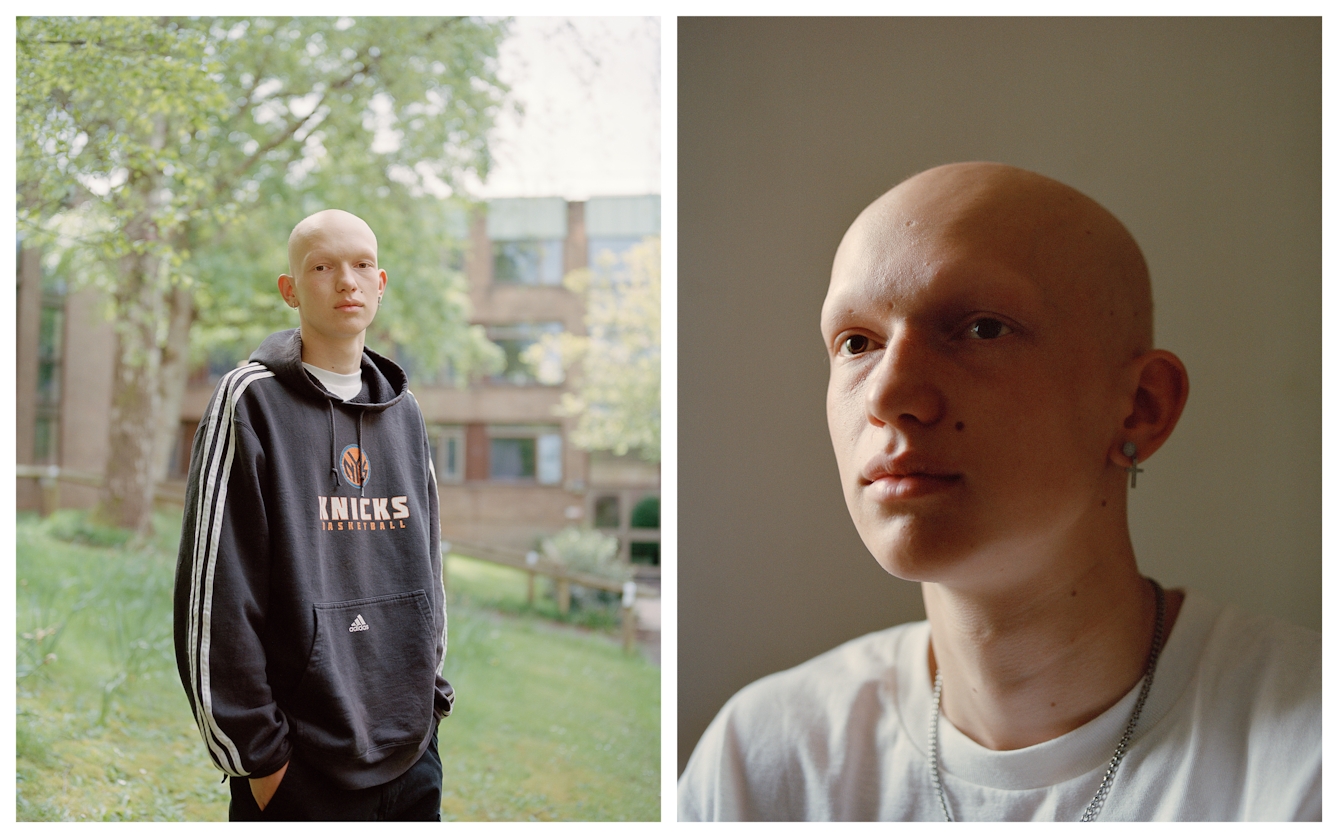
Tom.
It started falling out around Halloween 2023. I’ve had full-on alopecia for a couple of months now. It was a shock at first, but I already had a bit of experience with alopecia areata when I was taking my A levels, so I knew how to talk about it.
To lose all your hair is hard, especially when young and in the prime of life. I’m at university now, and when meeting new people, I’d much rather have hair. There’s a lot of pressure and you want to make a good impression. You clock people looking at you in a crowd because you’re young and bald. It gets a bit much with everyone having a judgement about you.
Interestingly, I felt more comfortable talking about it with friends I met at uni. I struggled going home – friends there had the shock of me leaving school with hair and coming back with none. You end up having a copy-and-paste conversation with everyone.
I met my current girlfriend at uni and went through the process with her. I was worried she was going to leave me because of my hair. But she stayed and helped me through it. At university you’re on your own, so to have her there really helped. I don’t know what I would have done with the emotional support from my girlfriend.
I had to deal with the process of losing my hair quickly, as you can’t do anything about it and I didn’t want to sulk around. I had long hair, so I got a buzz cut. You might as well own it, instead of being embarrassed.
I don’t find it too difficult to talk about it. In my age group everyone is open-minded and people express themselves. Social media has definitely helped with this. Scrolling on TikTok you see so many people’s different lives. I joked through it a lot with mates – I would say I look like my thumb.
Next year if I’ve still got no hair, I’d go out at Halloween as Shrek. Joking about it made it so much easier. People can relax because I’m not all stuck up about it.
Matt
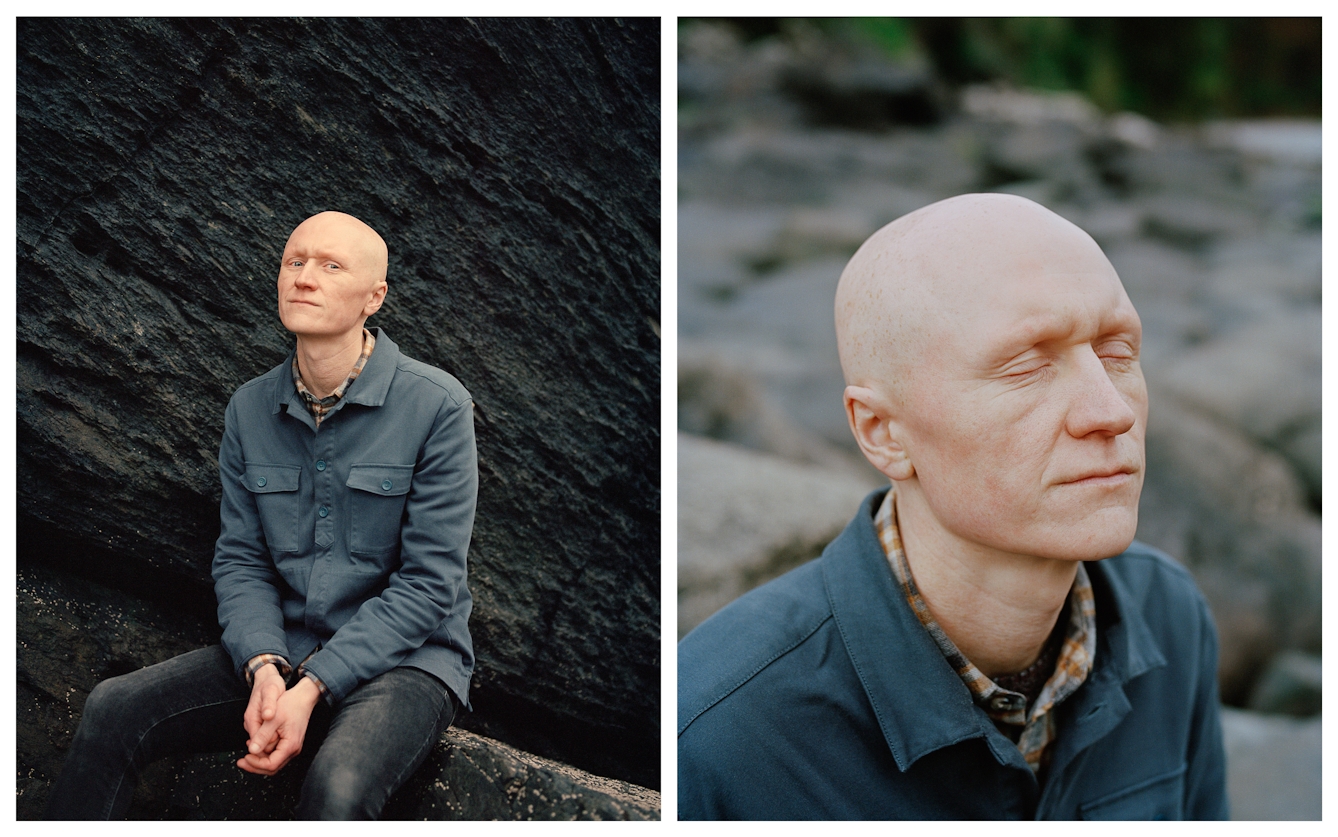
Matt.
I found my first bald spot in July 2021 and by September 2022 the last of my hair fell out. I’m a very different person now and I think I put too much weight on how I looked before. I was quite rugged, I had long hair and a beard. I used to look young for my age; now I look almost middle-aged. My hair was part of my personality, which made losing it even more devastating. I’m not as expressive or as outgoing as I used to be. When I moved to Devon I didn’t go out of my way to make friends, even if opportunities were presented to me.
I’m aware men do generally hide their emotions, and I fell into that trap. I made it harder for myself by not being open. It was a refusal to believe what was happening, but also a reluctance to burden other people. In hindsight, I should have shared how I was feeling with more people, instead of just keeping it inside.
Isolating myself was a form of defence. If I didn’t start the conversation, I wouldn’t get hurt. There are people that I still haven’t seen since I lost my hair three years ago. I’ve properly cut myself off from them, so I don’t have to go through the awkwardness of explaining my alopecia. I know what to do to help myself, but I’m not doing it.
One of the significant moments that sticks out was when I went out for the first time, having shaved my head. We went to a secluded beach and I didn’t wear a hat. Shaving my head was huge. It really took back the power; it was the first step in fighting back.
Obviously, you hear it’s worse for women, but it doesn’t make it any less of a hardship for a man. There are other bald guys, sure, but they still have huge features, whether that’s a beard, or eyelashes, or eyebrows. Only when you lose them do you see the real role they are playing in how someone looks. When you stand me next to a bald man, it will be very clear I am not just a bald man.
My family are so important. They have helped to show me that I’m still me. I couldn’t prevent my daughter from going to a club or soft play, or not take her to nursery. She gave me a reason to go out and face the world. Receiving love is such a powerful thing, I don't know how I'd have coped without that.
Raymond
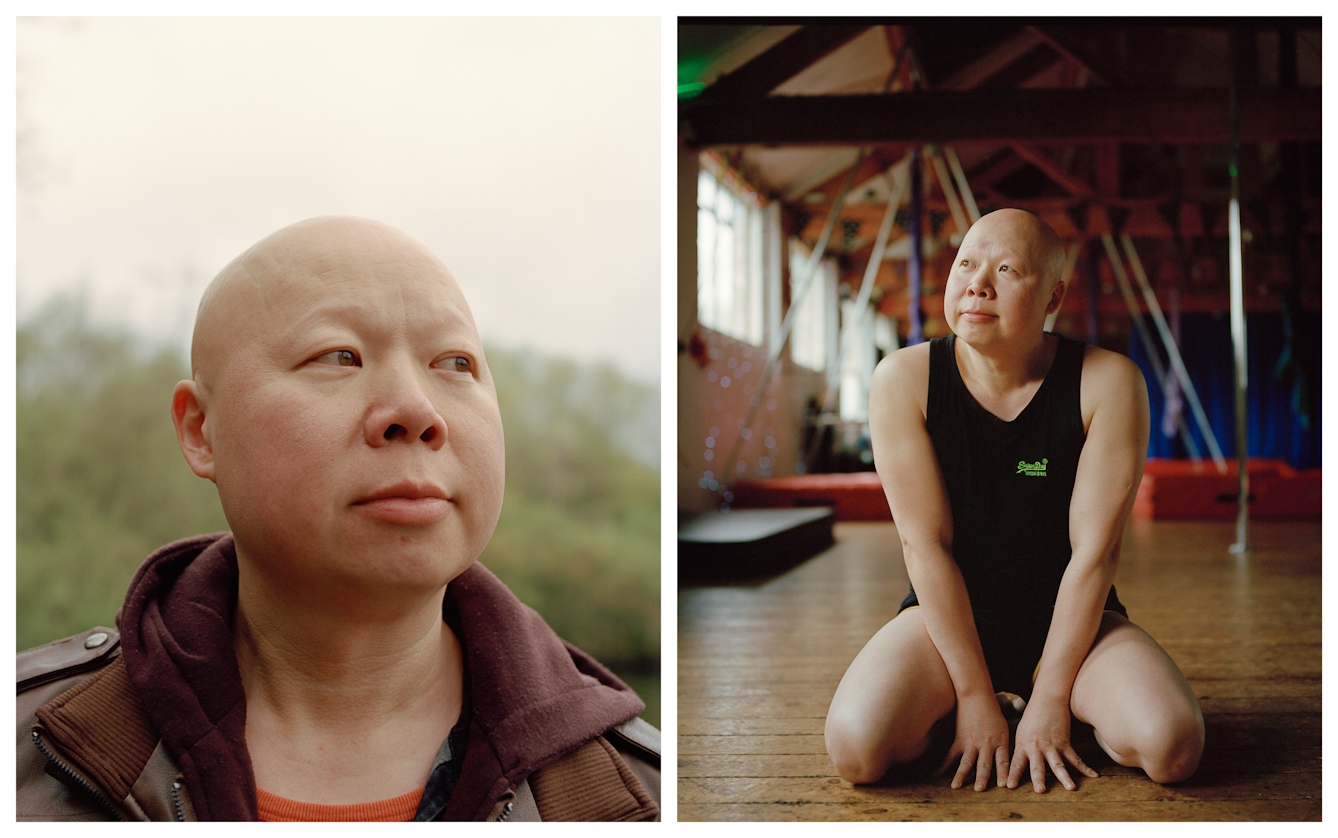
Raymond.
I first developed alopecia when I was ten years old, with a fist-sized bald patch on the back of my head. My parents got really worried and took me to the GP. I felt scared because I could see that my parents were scared. It persisted for a quite a while between 10 and 18. The headteacher at school allowed me to wear a cap in school, which made a lot of the students envious.
When I turned 18, I was finally comfortable with taking my hat off and just being myself with my group of friends. When I hit 20 it all fell out within two weeks.
Instead of waking up to find clumps of hair on my bed, I decided to shave it off, and I’ve been bald ever since. I do remember looking in the mirror and styling my hair. I miss spending time trying out new hairstyles, but I’ve just accepted it.
All of my friends love me being bald. If I grew my hair back, they would pin me down and shave it all off.
It’s a reset button. You can create a whole new image for yourself. It’s a new point of your life – don’t think of it as a negative. Alopecia hasn’t stopped me from doing anything I want to do. This includes outdoor activities like kayaking, paintballing, rock climbing, gym, archery.
I can see a lot of my male friends are not the type of person to open up. I sometimes approach them to let them know that if they need to talk, I’m here to listen. I can see when someone else is going through troublesome emotions because I’ve been through bad situations myself. I’m a caring kind of person, I like to see people being happy.
Sam
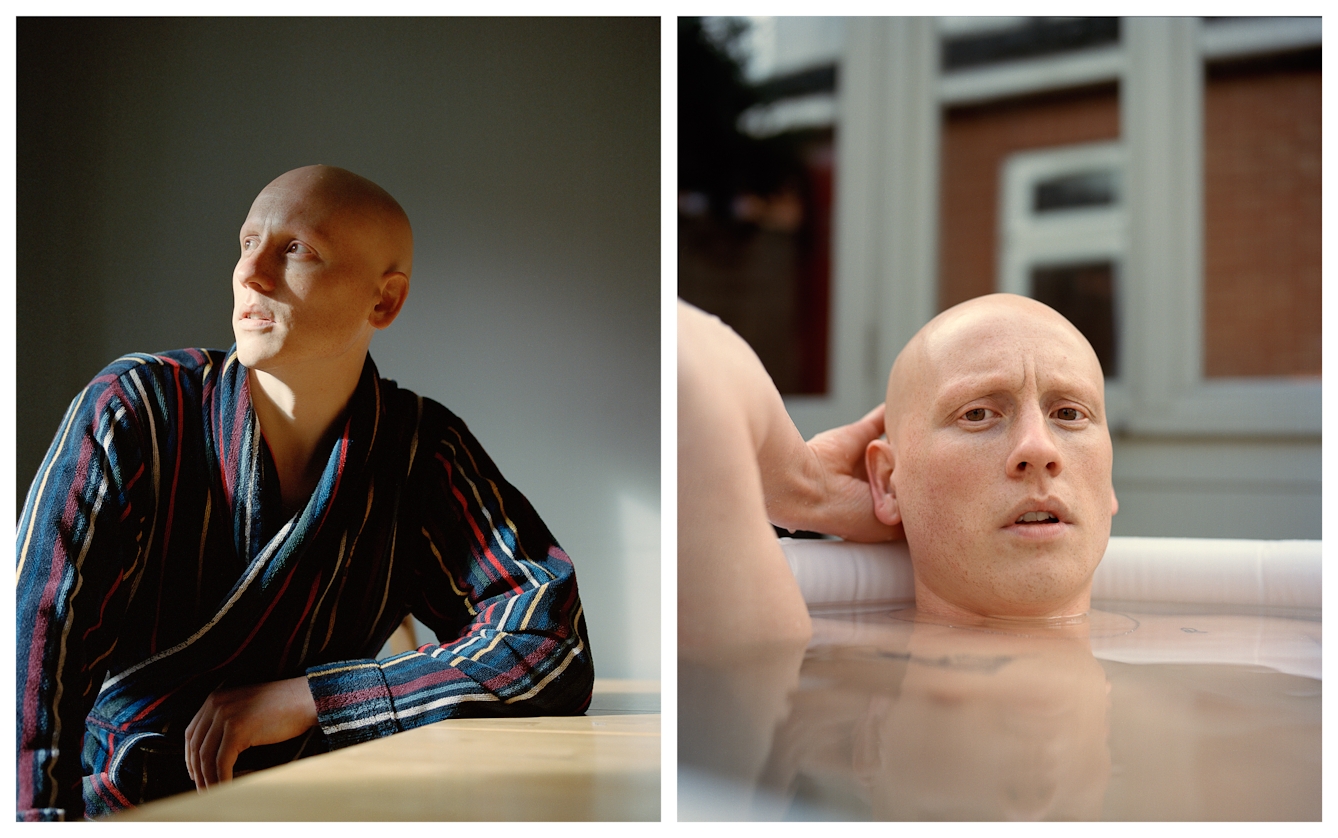
Sam.
When I went back home for Christmas in 2019 after I lost my hair, people were quite shocked at what I looked like. My mam has alopecia, and she was quite worried what it would be like for me. It was such a stark difference. They think you’ve got cancer and presume the worst.
As the months went by, eventually you start socialising, and by that point I had accepted it. It’s not the actual thing, it’s the way people react to the thing. My friendship group always had an understanding and openness.
I moved to London for acting and writing, and to make a name for myself. No one in London knew me before my hair fell out; it was a fresh start. People still to this day think I shave my head, and eyebrows and face.
Before my hair fell out, I used to shave my legs. It was at the time when I was doing Muay Thai [a Thai martial art], and I used to wear my mam’s tanning moisture. These aren’t classic male traits, but I was never bothered what people thought.
After Geordie Shore came out, it was about being smooth – getting a wax, a fake tan, totally prim men who are big muscular men doing their hair in big quiff hairstyles. People were telling me, “I wish I had alopecia.”
Having no hair has not hindered my dating life. There’s a bit of a blow when you actually see yourself fully scalped, and I was like, “Shit, that’s what my skull looks like.” When I got my head shaved, my barber was like, “You’ve got a good shape skull.” I was like, “Fuck, that’s a relief – imagine if you didn’t?”
That’s the stark reality: you might not look as good as you did, or you might not look as good as you thought you did, but, ultimately, who cares what people think? But at the same time, you do care what people think.
Tom
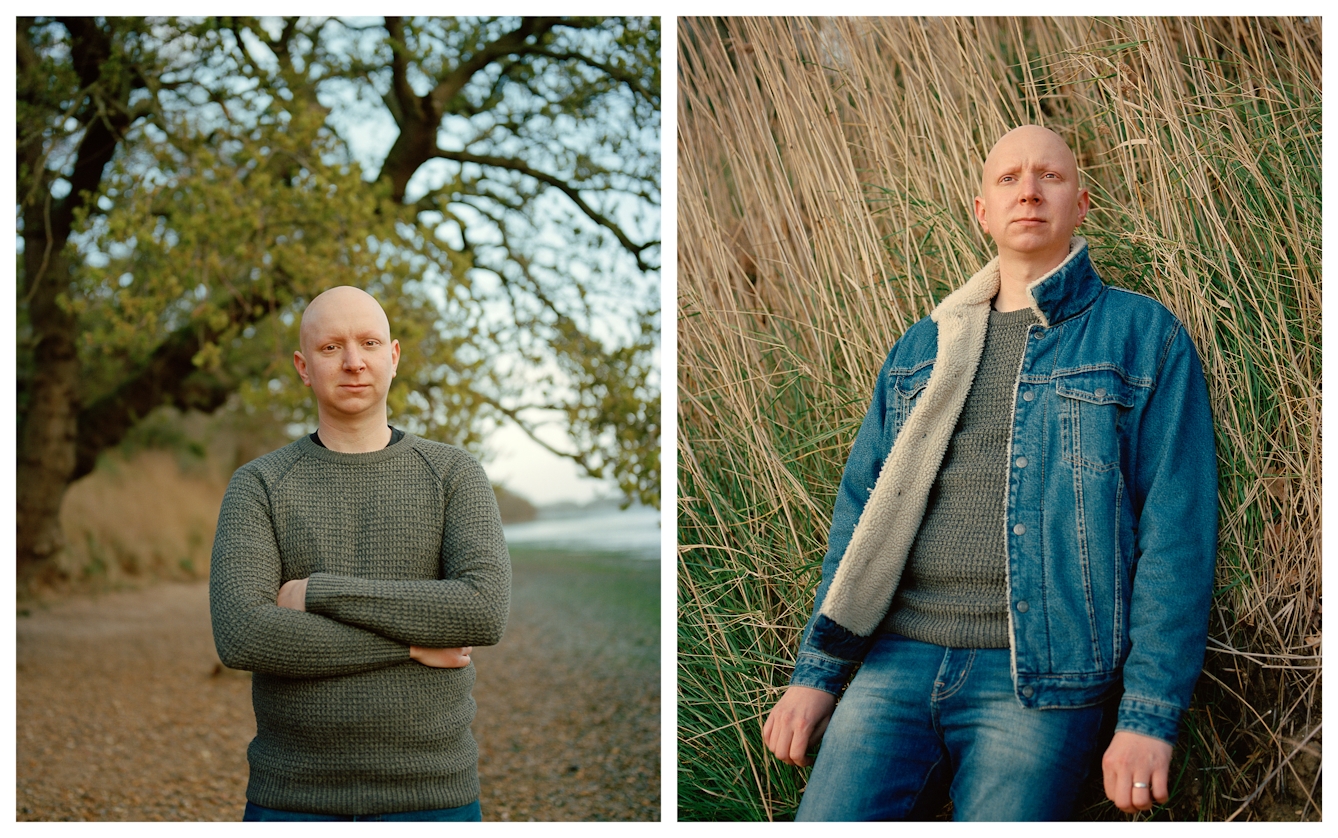
Tom.
It took about a year to accept my alopecia. The progression was rapid, which meant I was forced to accept it quite quickly. When I started to see the patches, I went to the doctor and they told me that it was alopecia. I could try steroid injections, but they wouldn’t guarantee it would work. At that point I thought my cards had been dealt: just live with it.
At the point I had 60 per cent patches and 40 per cent hair, I shaved all my hair off during a lunch break, as it was difficult to have any form of hairstyle. When I returned to work, I just went to the bathroom, locked the door and sobbed for five minutes, and then carried on with my work.
A man with hair blends in with the crowd; without hair I was forced to become more confident. I didn’t have a choice. It was either become a hermit, or make the most of the situation.
Looking back, I wasn’t uber-confident, I wasn’t the centre of the party. Now that I have nothing to hide behind, I just feel more confident, more me. I stand out. A tall man with dark hair – there’s millions of them. I’m more adult and masculine without hair. I think I’ve been blessed with a decent-shaped head.
I’m fortunate that I’ve accepted it so quickly. My group of friends would struggle big time if they had alopecia. They like to look good and dress well and are into selfies; they care about their appearance a lot more than I do.
Being light-hearted about it has helped. If I can see humour in alopecia, it puts everybody else at ease; there’s less tiptoeing around and less questioning. My wife calls me a beacon because I’m quite tall and now have a big shiny head – I’m very easily spotted in a crowd!
Philip
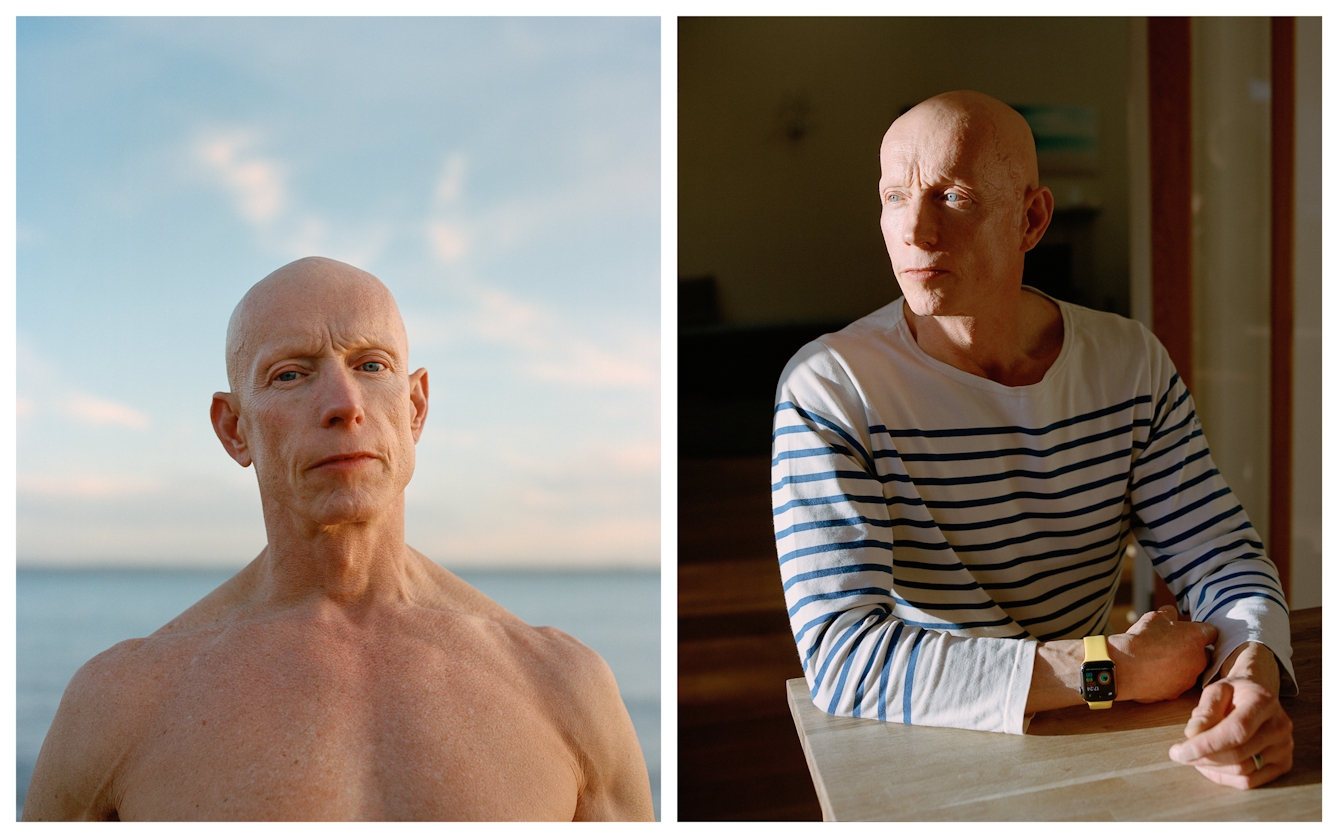
Philip.
I first started losing my hair aged 12. First a patch at the front and top of my forehead. At the time the GP gave me paraffin oil to put in my hair, so I had this long, straggly, greasy, horrible head. It was horrific going through school with it; people were saying, “You’ve got a big hole on your head.”
Those formative teenage years were hard. The patches would come and go. When I finished school at 16, it all just fell out – eyebrows, eyelashes, hair.
I just had to get on with it on my own; no teachers took me aside back in the 1980s. It was hardcore – you just got on with it. I dressed as a skinhead. I thought I was hiding it by wearing a big woolly hat and running around in big leather boots. People used to target me to want to have fights because I had a bald head. My mates all knew, but no one ever talked to me about it; I didn’t think they knew.
My hair grew back when I was 19 and I went to college to go on to university. From then until a few years ago, my hair’s always been coming and going.
I never talked about it, even with girlfriends I had. When patches started to reappear, I got grumpier and grumpier, but I never felt like I could talk to them about it. This is the first time I’ve sat down and spoken in depth about it. We are a hidden subculture; we are very much isolated.
I’ve never sought out support groups or things like that. I don’t think guys are very good at it. I will meet up with my friends, but they don’t feel comfortable talking about stuff like that. A couple of them have male pattern baldness, but they don’t want to talk about it.
I always felt like I had no control, it was always down to pure fate. I have this mentality that everything will be all right when the hair grows back. I never felt comfortable seeing myself in photographs; maybe that’s why I got into lifting weights and doing martial arts. I think I was never very happy with my appearance, but I could control the way my body looked. It was compensating for my lacking the confidence. It did make me feel less masculine – you’ve got no pubic hair, you haven’t got body hair, you can’t grow a beard.
When your hair falls out you become invisible to people in shops, restaurants and work. You are just an entity. You’re of no interest, you have no value, people don’t need your attention or approval. I work with children and young people, however, and they’re fantastic because they just don’t give a damn.
Bhavin
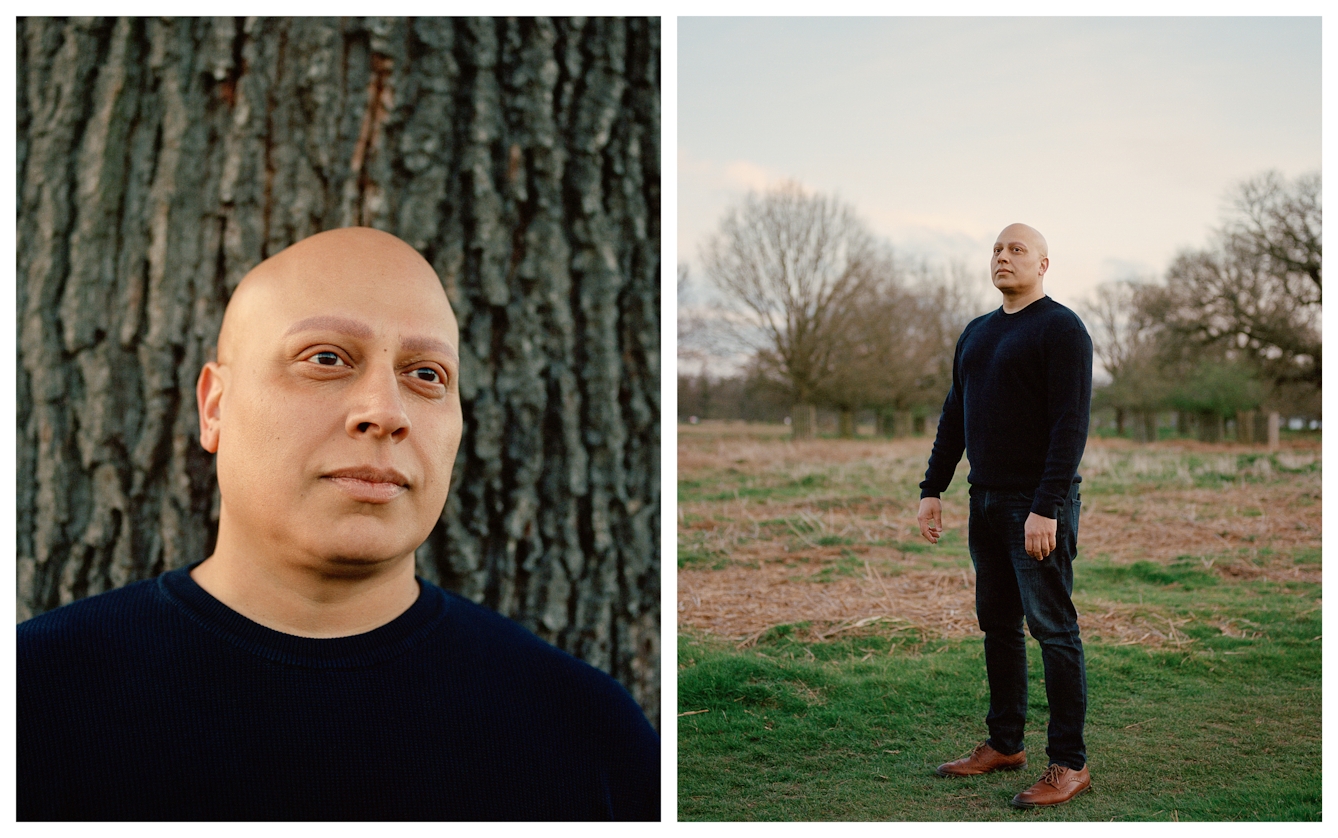
Bhavin.
It happened just after the birth of my first child. It was about 45 days in which I went from a relatively full head of hair to none at all. It was a really difficult time at the beginning. Losing my hair was like I had lost a part of myself. I knew about it before because we had a history of alopecia in my family.
I didn’t talk to anyone about it. I handled everything all by myself. I didn’t want to burden my wife, my family. I remember feeling guilty when I was going through it because, ultimately, it was not a big deal – it was just hair. It shouldn’t have been as upsetting as it was; it shouldn’t have felt that it was the most important thing.
I was still the same person but I was mourning the loss of my former self. But I also felt that I had no right to do that because other people have conditions that are far worse. It’s not the loss of a limb. I was still able to function.
There was a point about a year in when I stopped being so obsessed about it, but then I stopped feeling anything. I collapsed inwards. That was a dark time; I had dangerous intrusive thoughts. It became a bit of a monster. I felt like I had to deal with this before I could go back in and be a person in my family.
I was speaking to someone at that time, and they said something that stuck with me: “It doesn’t matter how you look – a lion without its mane is still a lion.” I really held onto that and I created this little logo for myself as a constant reminder. I put it on my clothes, I painted it onto my gym. I started working out, I got myself back into shape.
I feel stronger and more confident now, so in a lot of ways it has made me feel empowered. It’s almost like I’ve skipped past male pattern baldness. I think deep down nobody can really understand, there’s no point of reference for anyone else. It’s difficult for me to say to someone, “Hey, when I take a breath it feels funny because I have no hair in my nose.”
Michael
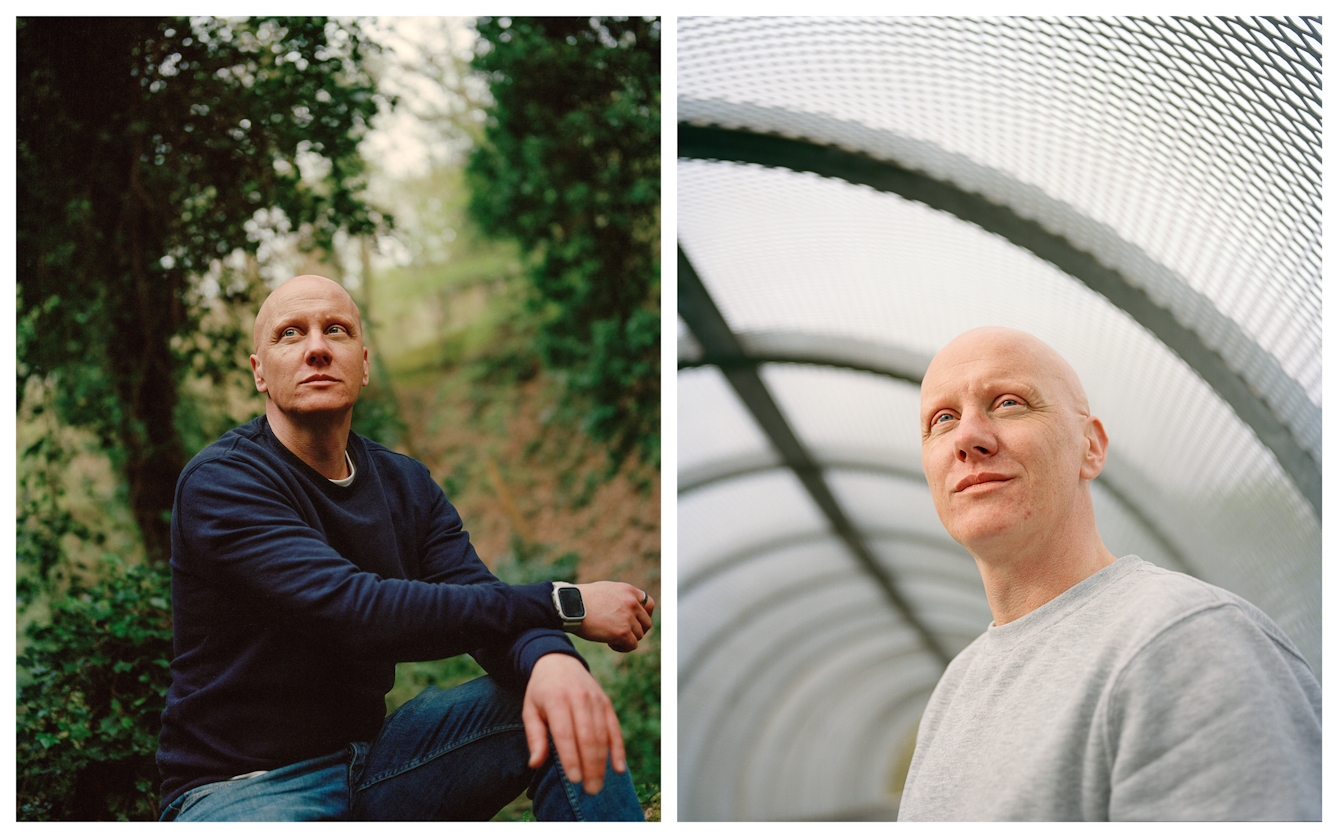
Michael.
I started to get small patches that began to rapidly get bigger, and I was completely bald by the age of 13. It is an age where you’re trying to fit in with everyone and not stand out. All of sudden I was completely different to everybody.
It was really hard to adjust. I wore a baseball cap everywhere I went, to try and blend in. It was a tiny little plaster on this massive problem. Being forced to go to school without anything covering my head was sink or swim, but you have to deal with it.
It was horrible, and the worst time to have it happen, but it has made me the person I am today. The confidence I have was instilled in me during those years of having to go to school and face it. I had a small group of friends that were pretty good, and no massive bullying. I was always really good at football, probably the best in the school, and people knew me for that.
I was still getting used to it at 17, 18. As a teenager you start getting interested in girls, thinking about how you look, dressing up and going out to pubs. A lot of my friends were growing beards; I was feeling a bit feminine, as I couldn’t be this big, brash man. That hit my confidence a bit.
There are days even now where I feel this is terrible, I hate having no hair, this is the worst thing ever. I look so stupid and so weird. A lot of people associate having a big full beard with being a man; having a fresh baby face is not manly. It would be lovely to grow a beard and experience it, just once.
It’s nice, however, when people ask me directly if I have alopecia. I would rather people be curious and ask questions than assume. The worst thing is when people think I have cancer and that stops them from asking.
Jamie
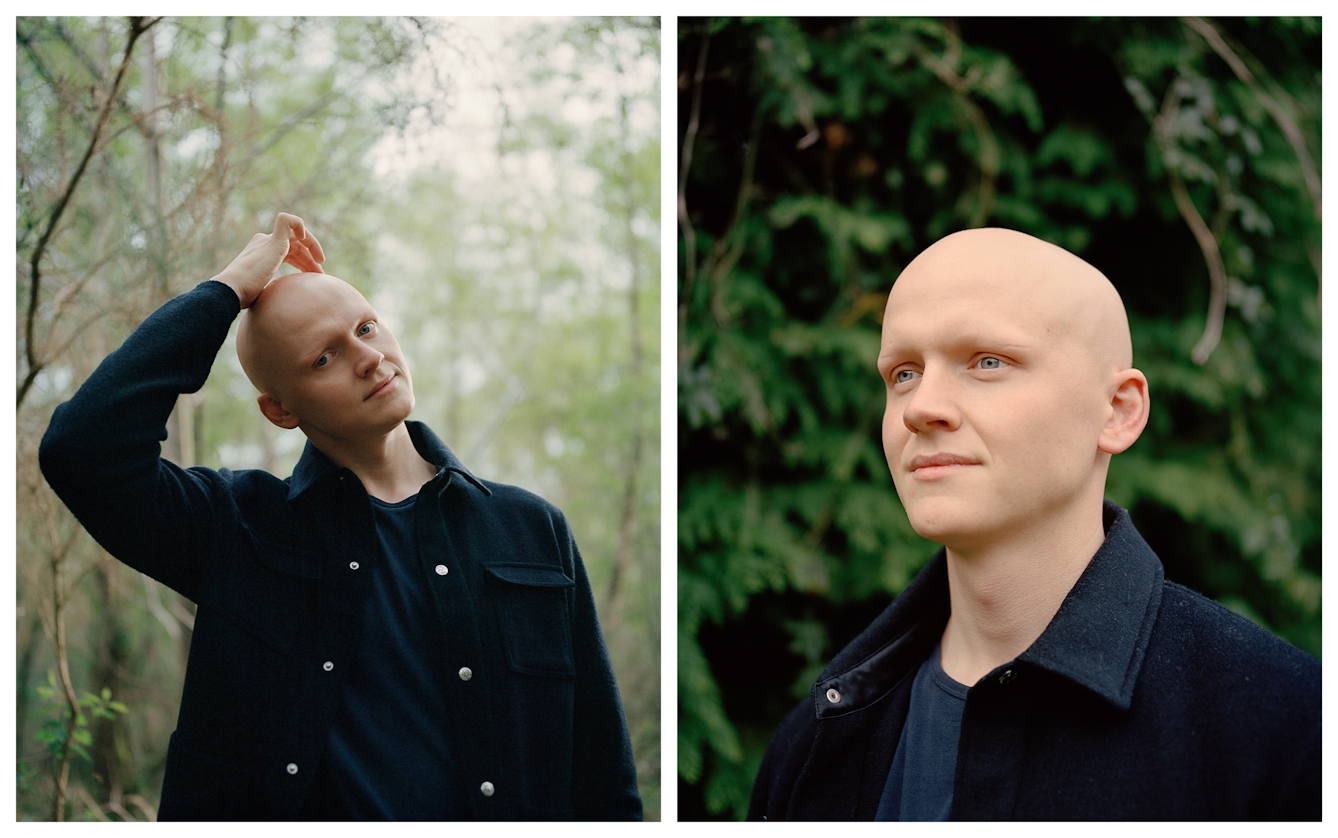
Jamie.
My hair started falling out three years ago now. I first noticed it on my beard. I had quite a thick, dark beard and I had a little patch on my neck. I thought it was nothing. It was slow at the start, and then it progressed to my face. I could shave my beard, so it was very easy to conceal it and make out nothing was wrong.
The anxiety started to arise when it spread to my eyebrows, and I had that that “oh shit” moment – it’s seriously spreading everywhere. That was tough, waking up with hair on my pillow, hair falling out in the shower. I wouldn’t wish that on anyone. The best thing, that I put off for way too long, was shaving all my hair off. It was very liberating. When your hair is in clumps, it looks weird, and you just look ill.
I kept it from my partner as it progressed. Once she became aware, it made it a lot easier for me, because I knew that she knew. Then it was an open dialogue between us, and it was really helpful.
When I shaved my hair, I told my friends what was happening. I got it out there straight away by sending them a selfie in the mirror. Obviously they said, “You look great; we don’t care.” But I was worried the whole time about what people would say and think.
Appearance and hair, to me, was a big thing. Back in the day I used to be that little kid with that crazy curly blond Afro. It was always something that people brought up. I went through phases of doing crazy things with my hair, like straightening it, trying out different styles. It was a big part of me, so it did feel like losing a friend.
Sometimes it can be harder for men and it’s not something that gets enough attention. You can wear wigs, put makeup on, but for me that didn’t feel like an acceptable thing to do as a man. Once I had come to terms with what was happening, I realised I had to get on with it. Life is too short to dwell and let it ruin my entire life.
About the photographer
Orlando Gili
Orlando is an award-winning portrait and documentary photographer with a focus on individual eccentricities and the things that bring us together. His career combines personal photographs with assignments for publications such as The Economist, Guardian Weekend Magazine and Telegraph Luxury. Bold colours and a playful intimate feel are the thread that tie together all his pictures. Previous photo books include ‘Trivial Pursuits – The English at Play’, which was a natural progression from his first photo book about football fan culture, ‘Que Sera, Sera’.

